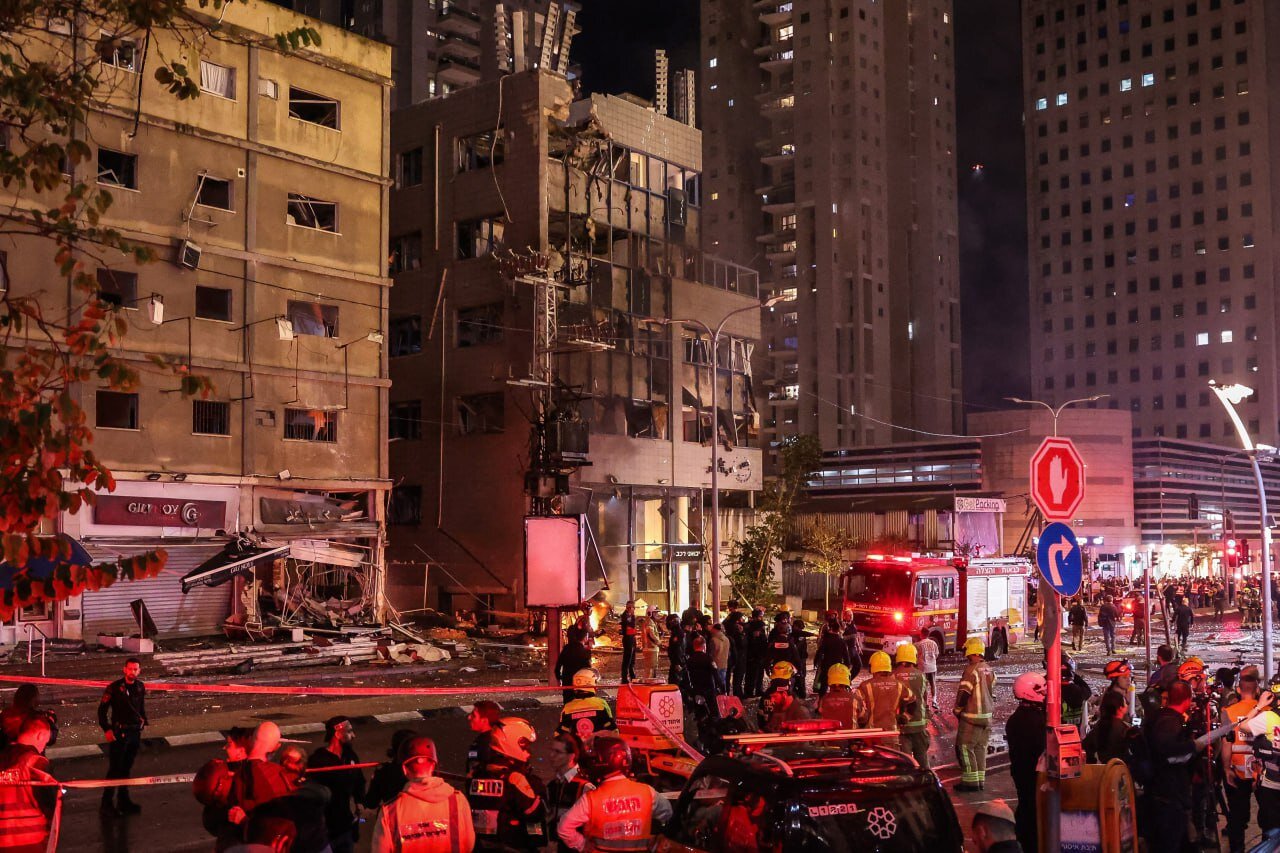Tel Aviv on fire amid Hezbollah attacks

TEHRAN - Hezbollah has staged one of its largest attacks on Tel Aviv in response to the deadly Israeli aggression on the Lebanese capital, Beirut.
On Monday, Israeli Prime Minister Benjamin Netanyahu outlined three conditions for a settlement with Hezbollah.
He told the Israeli Knesset that these included impunity for the regime to violate Lebanon’s sovereignty in the south, something that has been rejected by the Lebanese parliament speaker.
U.S. envoy Amos Hochstein arrived in Beirut on Tuesday to exchange the Israeli side’s conditions for a truce.
His visit coincided with one of the deadliest Israeli attacks on Lebanese civilians since the war erupted.
The Lebanese resistance responded to the Israeli aggression with surface-to-surface long-range missiles and drones to strike Tel Aviv and its suburbs.
Footage shows extensive damage in the Israeli commercial hub including high-rise buildings set ablaze and streets filled with panic and emergency services.
In one area, Israeli police confirmed that “these are not interception fragments (from the Iron Dome and other Israeli air defense systems); it was a direct hit, and there is fear of building collapses.”
Israeli media said sirens sounded across at least 20 cities, stretching from Netanya to Tel Aviv, causing a power outage in parts of Tel Aviv. Videos circulating online showed areas of Tel Aviv’s suburbs without electricity.
A recent Hezbollah attack on Haifa struck an energy plant that left parts of Haifa in the dark.
The number of rockets, missiles, and drones launched overnight from Monday to Tuesday is not clear.
At one point Israeli media reported at least four missiles had targeted “Tel Aviv in the latest barrage”.
A direct hit struck what Hebrew media claimed was adjacent to a shopping mall in the Ayalon Mall area.
Following the attack, Ben Gurion Airport was forced to close.
The Israeli military acknowledged that several rockets fired from Lebanon struck Tel Aviv, including Ramat Gan.
Other areas of Israel also came under attack. One rocket hit a bus in Bnei Brak, setting it ablaze, according to reports. Others indicated it was damaged from a nearby explosion.
An Israeli media outlet reported among the missiles that landed in Tel Aviv was a Fateh 110 missile, which is a surface-to-surface missile recognized for its significant destructive power. It is engineered to strike critical targets with pinpoint accuracy within a margin of up to ten meters.
Dozens of casualties have been reported. The final death toll is yet to be revealed.
At the same time, Haifa and its surrounding areas also came under attack. One hospital in Haifa said, “We received 39 injured people from Shfaram”.
Amid the overnight attack, Hezbollah put out a statement that read, “Within the framework of the Khaybar operations, our fighters launched an air attack with a squadron of qualitative suicide drones on sensitive military points – which will be announced later – in the city of Tel Aviv.”
On Tuesday morning, footage showed the aftermath of a rocket fired from Lebanon that had made an impact on the Beit Lid military base north of Tel Aviv.
Reports circulated that Hezbollah targeted Ramat Gan’s security complex with a missile aimed at a building belonging to the Military Intelligence Unit 8200.
Early Tuesday morning, Hezbollah issued the first statement related to its assault on Tel Aviv.
“As part of the Khaybar series of operations, and with the call of ‘We are at your service O Nasrallah’, the fighters of the Islamic Resistance at 8:45 PM on Monday 18-11-2024, targeted the Tel Haim base (belonging to the Military Intelligence Division of the “Israeli” enemy army), 120 kilometers from the Lebanese-Palestinian border, in the city of Tel Aviv with a barrage of qualitative missiles and a squadron of attack drones, hitting their targets accurately.”
A squadron of attack drones on the Regavim base (a military base containing training camps for the Golani Brigade) 65 kilometers from the Lebanese-Palestinian border in the southeast of the occupied city of Haifa, was also struck and hit their targets accurately, Hezbollah announced.
Another statement declared that “resistance fighters targeted an Israeli drone of the Hermes 450 type over the skies of Al-Taybeh with a surface-to-air missile. The drone was successfully shot down and seen ablaze.”
On Tuesday morning, Tel Aviv woke up to more explosions as air raid sirens sounded in dozens of cities in central and northern Israel. Another Hezbollah missile barrage has been reported.
Hezbollah said it targeted “a training base for the Paratroopers Brigade in the Karmiel settlement with a rocket barrage” on Tuesday.
Israeli media cited former senior Shin Bet official Adi Karmi as saying, “Striking the home front from Hezbollah is a major achievement with significant importance.”
Israeli activist Uri Feltman conceded that “Netanyahu’s claim of wiping out 80% of Hezbollah’s missiles was pure fantasy.”
What concerns those in Tel Aviv is that Hezbollah’s capability to strike them with missiles and drones remains intact.
It also shows that Israeli defenses are increasingly vulnerable, and strikes by the Lebanese resistance movement are getting more accurate.
Leave a Comment